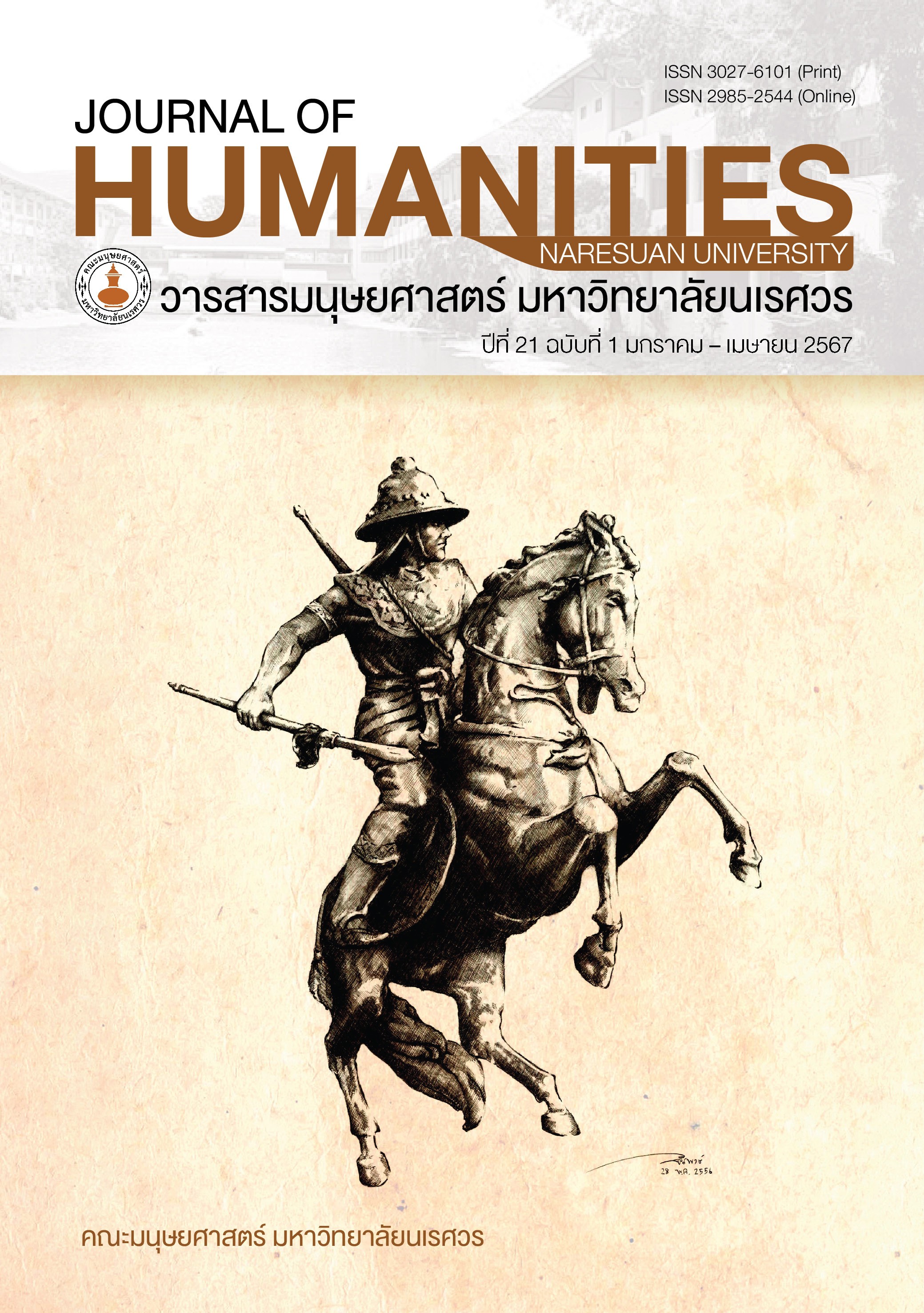การอ้างถึงและอุดมการณ์ในแฮร์รี่ พอตเตอร์กับเครื่องรางยมทูต: ความเป็นปรปักษ์และความเป็นพวกพ้อง
Main Article Content
บทคัดย่อ
งานวิจัยชิ้นนี้มีวัตถุประสงค์เพื่อศึกษาอุดมการณ์ความเป็นปรปักษ์และความเป็นพวกพ้องด้วยการใช้กลวิธีการอ้างถึง (reference) ที่ปรากฏในวรรณกรรมเรื่องแฮร์รี่ พอตเตอร์กับเครื่องรางยมทูต โดยวิเคราะห์วาทกรรมพูด (spoken discourse) จำนวน 207 วาทกรรมซึ่งคัดเลือกจากบทสนทนาของกลุ่มผู้วิเศษ 4 กลุ่มจากวรรณกรรมเรื่องนี้ตามกรอบมิติทั้งสามของวาทกรรมของแฟร์คลัฟ โดยวิเคราะห์จากตัวบท ปฏิบัติการทางวาทกรรมและปฏิบัติการทางสังคมและวัฒนธรรมที่การอ้างถึงปรากฏ ผลการศึกษาพบการใช้การอ้างถึง 10 กลวิธี คือ การใช้ชื่อเต็มของบุคคล การใช้นามสกุล การใช้ชื่อต้นของบุคคล การใช้สรรพนามบุรุษที่ 3 การใช้ชื่อกลุ่มคน การใช้วลี การใช้นามบัญญัติ การใช้คำบอกอาชีพ การใช้ชื่อองค์กร และการใช้คำย่อ ผลการวิจัยยังพบชุดอุดมการณ์ย่อย 7 ชุดภายในอุดมการณ์ความเป็นปรปักษ์และความเป็นพวกพ้อง นอกจากนี้ผลการวิจัยยังแสดงให้เห็นถึงการมีอำนาจเหนือกว่าในสังคมผ่านการใช้การอ้างถึง
Article Details

อนุญาตภายใต้เงื่อนไข Creative Commons Attribution-NonCommercial-NoDerivatives 4.0 International License.
ข้อความรู้ใด ๆ ตลอดจนข้อคิดเห็นใด ๆ เป็นของผู้เขียนแต่ละท่านโดยเฉพาะ คณะมนุษยศาสตร์ มหาวิทยาลัยนเรศวร และกองบรรณาธิการวารสารมนุษยศาสตร์ฯ ไม่จำเป็นต้องเห็นพ้องด้วย
เอกสารอ้างอิง
Ali, M. K., Christopher, A. A., & Nordin, M. Z. F. B. (2017). Pronouns and ideology in newspaper discourse. International Journal of Applied Linguistics and English Literature, 6(3), 168-179.
Angkapanichkit, J. (2014). Discourse analysis. Bangkok: Thammasart University Press.
Birner, B. J. (2013). Introduction to pragmatics. Hoboken, NJ: Wiley-Blackwell.
Celce-Murcia, M. & Olshtain, E. (2000). Discourse and context in language teaching: A guide for language teacher. Cambridge: Cambridge University Press.
Fairclough, N. (1992). Language and power (5th ed.). London: Longman.
Fairclough, N. (2003). Analysing discourse: Textual analysis for social research. London: Routledge.
Fairclough, N. (2013). Critical discourse analysis: The critical study of language (2nd ed.). New York: Routledge.
Hasan, J. M. (2011). A linguistic analysis of in-group and out-group pronouns in Hosni Mubarak’s speech. Journal of Basrah Researches (Humanities Series), 38(2), 5–24.
Hitchens, C. (2007, August 12). The boy who lived. The New York Times. Retrieved from https://www.nytimes.com/2007/08/12/books/review/Hitchens-t.html
McFarlance, A. (2012). Spells and hate speech: Linguistic violence and vulnerability in the Harry Potter Series. Reason Papers, 34, 145-156.
Perri, C. (2015). Harry Potter & the riddles of political Ideology (Senior Capstone Thesis). Glenside, PA: Arcadia University.
Rogti, M. (2019). Critical discourse analysis in literature-oriented classes: A theoretical perspective. European Academic Research Journal, 11(6), 3327-3341.
Rowling, J.K. (2007). Harry Potter and the deathly hallows. London: Bloomsbury.
Rowling, J.K. (2018). Fantastic beasts and where to find them. London: Bloomsbury.
Schiffrin, D. (2003). Approaches to discourse. Oxford: Blackwell Publishing.
Van Dijk, T. A. (1995). Discourse semantics and ideology. Discourse & Society, 6(2), 243-289.
Van Dijk, T. A. (2000). Ideology: A multidisciplinary approach. London: Sage.
Van Dijk, T. A. (2006). Ideology and discourse analysis. Journal of Political Ideologies, 11(2), 115-140.
Vollmer, E. (2007). Harry’s world: An exploration of J.K. Rowling’s social and political agenda in the Harry Potter series. UW-L Journal of Undergraduate Research, 10, 1-5.
Walters, T. L. (2015). Not so magical: Issue with racism, classism, and ideology with Harry Potter (Master’s thesis). Marquette, MI: Northern Michigan University.
Withawaphinyo, P. (2015). Language strategies used in the patriotic song of Thailand's national council for peace and order - NCPO. Journal of Liberal Arts, 15(2), 145-161.
Wodak, R., & Chilton, P. (2005). A new agenda in (critical) discourse analysis: Theory, methodology and interdisciplinarity. Amsterdam: John Benjamins Publishing Company.
Wodak, R., & Meyer, K. (Eds.) (2009). Critical discourse analysis: History, agenda, theory, and methodology. In Methods for critical discourse analysis (2nd ed.) (pp. 1-33). London: Sage.
Young, T. (2017, July 1). J.K. Rowling’s schizophrenic politics. The Spectator. Retrieved from https://www.spectator.co.uk/article/j-k-rowling-s-schizophrenic-politics-1-july-2017


